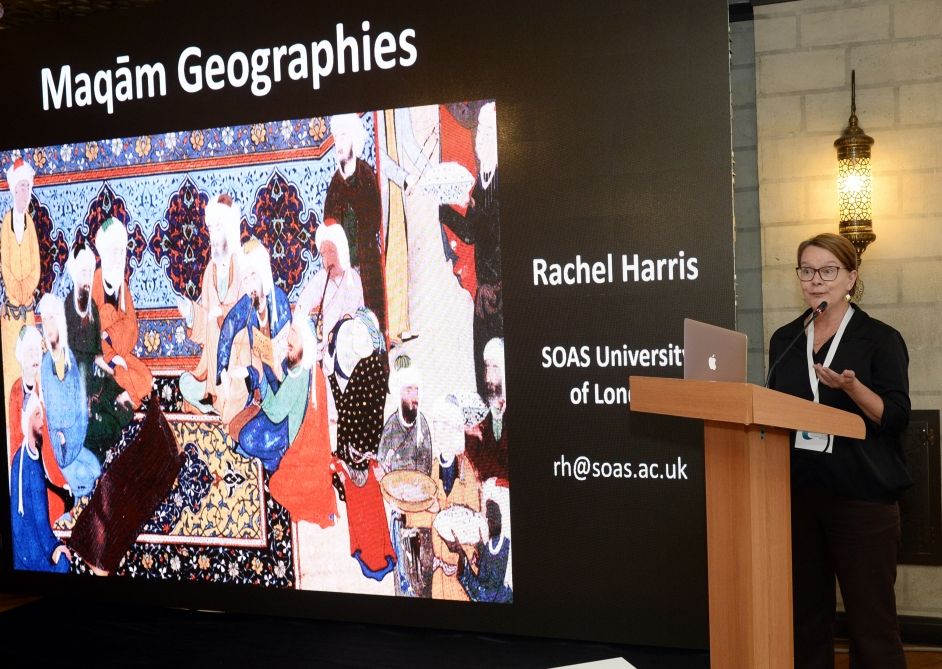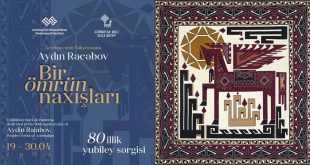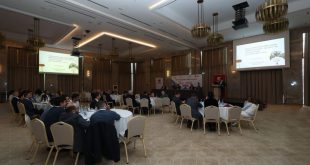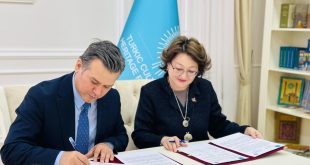
Scientific Symposium has been held within the 6th International World of Mugham Music Festival.
The symposium gathers experts from Azerbaijan, USA, Great Britain, France, India, Israel, Canada, Kazakhstan, Uzbekistan, Tajikistan, Turkiye and Japan, Azernews reports.
The main goal of the event is to create a favorable environment for productive discussions on new research directions, modernization, popularization and preservation of magam-based music.
At the opening of the symposium, Deputy Culture Minister Saadat Yusifova spoke about the stages of historical development of mugham art, which is an integral part of Azerbaijani culture.
In her speech, she emphasised that mugham has been formed by passing through the process of gradual development and evolution lasting for centuries, stemming from ancient rites. Emerging from divine rhythms, mugham expresses emotions from the depths of the human heart and conveys messages on a spiritual level to those who listen to it. The wonderful mugham rhythms oshow how deep the world of ideas of the Azerbaijani people is.
Mugham is one of the Azerbaijani nation’s genetic codes that make up the national-cultural identity and a means of self-awareness and freedom protection in today’s globalized world.
In the 2005 Decree of the President of Azerbaijan Ilham Aliyev on the “Establishment of the Mugham Center in Baku” it is noted that the mugham is a magnificent monument of the cultural and spiritual heritage of the Azerbaijani people. It is impossible to imagine Azerbaijani music without mugham, which was formed on a rich philosophical and literary basis. The role of mugham in the development of Azerbaijani music, which emerged as a synthetic art form by organically uniting examples of classical literature, is great.
President of the Heydar Aliyev Foundation, First Vice-President of Azerbaijan and ICESCO Goodwill Ambassador Mehriban Aliyeva once said:
“Mugham is our national wealth. Mugham is the bearer of the most beautiful features typical of the Azerbaijani people. Even today, mugham lives with its full existence as a spiritual treasure that has lived from the past to the present, and on the other hand, as an extremely modern art”.
In 2009, the International Mugham Festival was held in Baku for the first time in the world with the initiative and organizational support of the Heydar Aliyev Foundation.
Since then, the International World of Mugham Music Festival has become a large-scale cultural event, regularly held in the musical life of Azerbaijan, attended by traditional music performers and researchers of the East.
Well-known musicians and researchers from different countries of the world participated in the festivals held in 2011, 2013, 2015 and 2018. As part of the festivals, concerts were held with the participation of Azerbaijani and foreign musicians, an international mugham competition, an international scientific symposium and master classes were held both in Baku and in many regions of our country.
Musicians from Turkiye, Uzbekistan, Tajikistan, Israel, Afghanistan, Iran, Iraq, Greece, Great Britain, Mali, India, Jordan and Egypt have been invited to this year’s festival. As in previous years, well-known scholars have come together to explore the depths of traditional modal music under the organization of the Heydar Aliyev Foundation, the Culture Ministry, the Ministry of Science and Education and the National Conservatory.
President of the Azerbaijan National Academy of Sciences, academician Isa Habibbayli, who spoke at the event, noted that Azerbaijan is one of the main centers of mugham art and mugham studies, and said that this art has an ancient history, great traditions, and powerful performers in our country, and that mugham gained popularity and began to develop in Azerbaijan at the beginning of the 20th century.
ANAS President pointed out that the works and articles of Abdulgadir Maragayi, Fethullah Shirvani, Mir Movsum Navvab, and Uzeyir Hajibayli about mugham demonstrate that mugham art in Azerbaijan is developing on its own scientific basis, and that science has a great influence on the formation of mugham art.
Noting that the new stage in the period of independence is of great importance in the development of centuries-old mugham art, he added that a new generation of mugham science is already being formed in Azerbaijan. The academician emphasized that the progress in this field in recent years is based on the activities of First Vice-President of Azerbaijan, President of the Heydar Aliyev Foundation Mehriban Aliyeva, and major projects implemented under her leadership in recent decades.
It was brought to attention that thanks to the mugham competitions held as a result of the activity of the President of the Heydar Aliyev Foundation Mehriban Aliyeva, a generation of young mugham performers is growing up in Azerbaijan.
The priceless services of Mehriban Aliyeva were mentioned in the inclusion of mugam in the UNESCO List of Intangible Cultural Heritage, and it was also stated that the launch of the International Mugham Center had a great role in the development of mugham art.
At the same time, confidence was expressed that today’s event will make significant contributions to the development of the science of mugham studies and the art of mugham performance in our country, while reviewing the depths, historical roots, and stages of development of mugham once again, it will also reveal important scientific and theoretical ideas for its further development.
President of UNESCO’s International Council for Traditional Music (ICTM), professor Svanibor Pettan said that it was a pride to participate in such an event in Azerbaijan, and spoke about the importance of the event and informed about the activities of the institution he represents. He noted that the main goal of the council is to engage in the promotion of traditional music in the world, to create connections between them and to serve the exchange of experience.
Stating that scientists from different countries of the world are gathered at ICTM, S. Pettan said that many of these scientists are currently participating in this event.
Highly appreciating the attention and care given to the preservation of mugham art and classical music heritage in Azerbaijan, the speaker touched on the events held by the Heydar Aliyev Foundation, the Ministry of Culture, and the Azerbaijan Composers’ Union to preserve this heritage in Azerbaijan. He stressed that the members of the International Council for Traditional Music under UNESCO also participated in a number of important events in Baku.
“These days we will participate in great events in Baku. This will have a positive impact on our rediscovery of mugham art, learning and approach to this heritage,” said S. Pettan.
The president of the Shashakom International Music Festival, public figure of Uzbekistan and the USA, musicologist, publicist and journalist Rafael Nektalov, who spoke later, said that mugham has the power to conquer the whole world. He pointed out that mugham art has attracted great interest in most countries.
Rafael Nektalov emphasized that Azerbaijani mugham and Uzbek-Tajik shashmakom are fed by a common root and form the foundation of Eastern music in general.
Later, in the plenary session of the symposium, British scientists Michael Church “Valuable musical traditions are under threat”, Rachel Harris’s “Geography of the Maqam: new approaches to the study and experience of the Maqam”, Azerbaijani scholar Sanubar Baghirova’s “On the concept of mugham in Azerbaijani music”, French ethnomusicologist Jean During’s ” Ethnomusical archive of recordings at the Paris Museum of Man. “Thousands of materials in open sources” were heard.
In the second half of the day, the Scientific Symposium continued with the sessions on “Contemporary mugham performance: between tradition and modernity”, “Problems of Azerbaijani mugham research” and “New research and research methods”. In the sessions, scientists from Azerbaijan, France, Great Britain, Tajikistan, Turkiye and Canada gave reports.
The scientific agenda of the symposium offered this year was different from the programs of the previous ones. Here, the topic of the speeches is clearly defined in the following direction, covering a number of problems: Teaching of maqam traditions at the modern stage; Issues of performance and perception of traditional music in the modern era, at the level of new socio-cultural challenges; The history of the formation and further evolution of major musical genres in the 20th century and at the present time; Collection, archiving and dissemination policy of maqam musical heritage. All these directions give the participants of the symposium an opportunity to share their new research or new research methods related to the music of the moment.
Many speeches at the symposium were presented with visual examples.
The scientific symposium will continue until June 22.
 Oval Useful news from Azerbaijan and Caucasus
Oval Useful news from Azerbaijan and Caucasus


